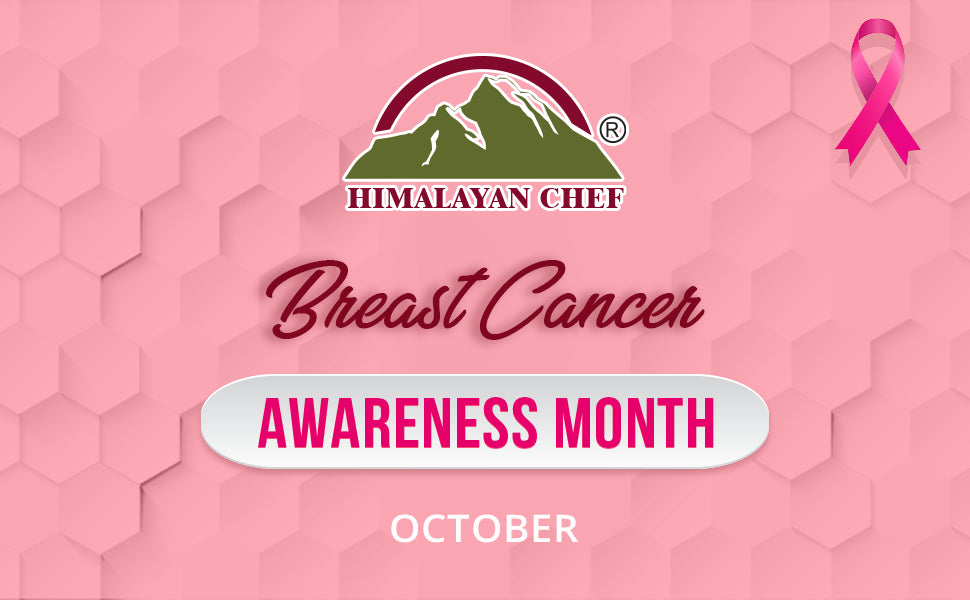Breast Cancer Awareness Month | Early Detection Save Lives
Posted by HIMALAYAN CHEF

In Pakistan, it is estimated that more than 85,000 cases of breast cancer are reported each year due to which 40,000 women die as a result of this devastating condition. Fortunately, Himalayan Chef is providing awareness this October regarding how one can reduce the risk factor of cancer among every individual especially breast cancer among females. Cancer is a disease in which some of the body’s cells grow uncontrollably and spread to other parts of the body. For that, every woman should undergo physical examination by the doctor regularly. Self-examination for a lump or abnormality in the breast can play an important role in the early detection of the disease.

According to the American Cancer Society, any of the following unusual changes in the breast can be a symptom of breast cancer:
Swelling of all the parts of the breastSkin irritation or dimpling in the breast
Redness, porous or thickening of the skin of the breast
A lump under the arm area
Discharge from the breast.
What Can Cause Cancer?

Smoking and the use of tobacco products are among the leading causes of unpreventable cancer. Smoking is strongly linked with breast cancer. Smoking not only affects the breast but it can also affect the lungs so badly that it can lead to lung cancer.

Poor dietary choices can contribute to cancer risk. A diet high in processed food, fat, and red meat, low in fruits and vegetables, and excessive consumption of sugary drinks can cause the risk of cancer. Diet can also help reduce the risk factor of cancer if taken sensibly. Intake of healthy food sources can cause the body to work properly and reduce the chances of different diseases.

A sedentary lifestyle and lack of physical inactivity are associated with an increased risk of certain cancers, including colon cancer and breast cancer. Physical inactivity is usually cause due to routine that includes working on a laptop for so long, sleeping all day, or maybe restrict movement due to any physical health condition. This need to be analyzed and resolved in order to have a healthy body.

Being overweight can cause a lot of health complications such as heart disease, diabetes, hyperlipidemia, as well as cancer. It is very important to control your weight to ideal body weight to reduce the risk factor of cancer. Obesity is caused by unhealthy eating which can be modified to healthy food choices in order to reduce the risk factor of cancer.

Inherited genetic mutation can significantly increase the risk of developing certain types of cancer, like breast and ovarian cancer. If any of the family members had cancer, this can increase the risk factor of cancer among the children, siblings, or grandchildren. Regular checkups and self-examination can reduce the risk factor.
Changes in the hormone levels can affect cancer risk. For example, exposure to elevated levels of estrogen associated with an increased risk of breast and uterine cancers. Hormone control pills or birth pills can also increase the risk factor of cancer.

Prevention, Early Diagnosis, and Screening
“Knowledge is power, and the sooner you have the information, the better.”
When cancer care is delayed there is a lower chance of survival, greater problems associated with treatment, and higher costs of care. Early detection improves cancer outcomes by providing care at the earlier possible stage.

A self-examination, in the context of health, refers to a systematic routine assessment that individual perform on their own bodies to monitor for sign of potential health issues or abnormalities. Self-examination is an important aspect of preventive health care, as it can help identify problems at an early stage when they are often manageable or treatable.

Mammography is a crucial tool in the early detection of breast cancer, which can significantly improve the chances of successful treatment. It is a specific type of X-ray that is used to screen for and detect breast cancer, Regular mammography is typically recommended for women starting around the age of 40 or earlier if they have a family history of breast cancer or other risk factors.
Foods That Fight Cancer
A healthy diet can play a significant role in cancer prevention. While no single food or dietary component can guarantee the prevention of cancer, a balanced and nutrient-rich diet can reduce the risk. Here are some foods and dietary guidelines that are associated with cancer prevention:

Foods like whole-grain bread, brown rice, and oatmeal are high in fiber, which is associated with a reduced risk of certain types of cancer, particularly colorectal cancer.

Beans, lentils, and peas are excellent sources of protein and fiber. They can help maintain a healthy weight, which is linked to a lower risk of cancer.

Green tea is rich in antioxidants, particularly catechins, which have been studied for their potential cancer-fighting properties.

These members of the allium vegetable family may help reduce the risk of stomach and colorectal cancers.

They are good sources of healthy fats, protein, and fiber. They can be part of a cancer-protective diet in moderation.

Fatty fish like salmon, mackerel, and sardines are rich in omega-3 fatty acids, which may help reduce the risk of certain cancers.

Turmeric: This spice contains curcumin, a compound with anti-inflammatory and antioxidant properties that is being studied for its potential cancer prevention benefits.

These are rich in antioxidants, vitamins, minerals, and fiber. Aim for a variety of colorful options, as different fruits and vegetables provide different nutrients. Cruciferous vegetables like broccoli, cauliflower, and Brussels sprouts are particularly known for their cancer-fighting properties.

Blueberries, strawberries, and other berries are high in antioxidants, which help protect cells from damage that can lead to cancer.

Spinach, kale, and other leafy greens are packed with nutrients that can help prevent cancer. They are rich in fiber, vitamins, and minerals.
Conclusion
Breast Cancer Awareness Month serves as an annual reminder of the importance of early detection, support, and solidarity in the fight against breast cancer. Breast cancer remains a formidable adversary, affecting millions of lives worldwide. However, the progress made in research, early detection, and treatment has given us hope and reason to believe in a brighter future.
By staying informed about the importance of self-examinations, mammograms, and healthy lifestyles, we empower ourselves and our loved ones to detect breast cancer at an early and more treatable stage. Equally important is the support network we create, as breast cancer is not just an individual's battle but a collective one. Together, we can uplift, encourage, and stand beside those who are fighting this disease, and we can celebrate the courage and strength of survivors.
Breast cancer awareness goes beyond wearing pink ribbons; it's a dedication to education, early detection, research, and support. It's a reminder that we have the power to make a difference in the lives of those affected by this disease. Let us carry the spirit of Breast Cancer Awareness Month throughout the year, advocating for progress, supporting those in need, and working towards a world where breast cancer is preventable, treatable, and ultimately defeated.
TAGS:
SHARE:


